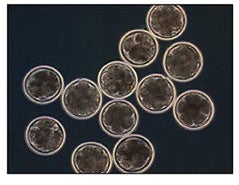Scientists create Britain's first hybrid embryos

Scientists confirmed last night that they have created human-animal "hybrid" embryos for the first time in Britain in an effort to develop new stem-cell treatments for disorders such as Parkinson's disease, stroke and diabetes.
The scientists merged human genetic material with cow egg cells that had most of their own genetic material removed. The resulting hybrid embryos were genetically 99.9 per cent human and 0.1 per cent cow.
The research is still preliminary and has not yet been verified in a peer-reviewed scientific journal, but scientists at Newcastle University insisted the results were valid, the hybrid embryos surviving for three days in the test tube.
Ultimately, the researchers would like such embryos to live for up to six days so that they can take embryonic stem cells from them and grow the cells into mature tissue. "The work was licensed in January and is underway. Some progress has been made but it's not yet the done deal, however it's generating excitement because of the current political debate," said Newcastle University's Professor John Burn. Lyle Armstrong, who led the research team, presented the preliminary findings of the project at a conference in Israel.
The Catholic Church has described such research as "monstrous" and has bitterly opposed it on the grounds that it meddles with the basic essence of what constitutes human identity. However, scientists believe that the work is essential.
The Human Fertilisation and Embryology Authority issued a research licence to Newcastle after seeking approval from the Government, which is proposing to update the current legislation to specifically permit such research after initially indicating that it was opposed.
Professor Colin Blakemore, the former head of the Medical Research Council, said: "These preliminary reports give hope that this approach is likely to provide stem cells for research without the use of human eggs or normal human embryos. The new Bill is intended to confirm the arrangements for regulation of this important area of research."
Professor Martin Bobrow of Cambridge University said: "If it turns out to be true that he has so rapidly been able to create an embryo that could produce a medically useful stem cell line, then that would be a very strong argument for pursuing that particular technique."
Join our commenting forum
Join thought-provoking conversations, follow other Independent readers and see their replies
Comments
Bookmark popover
Removed from bookmarks